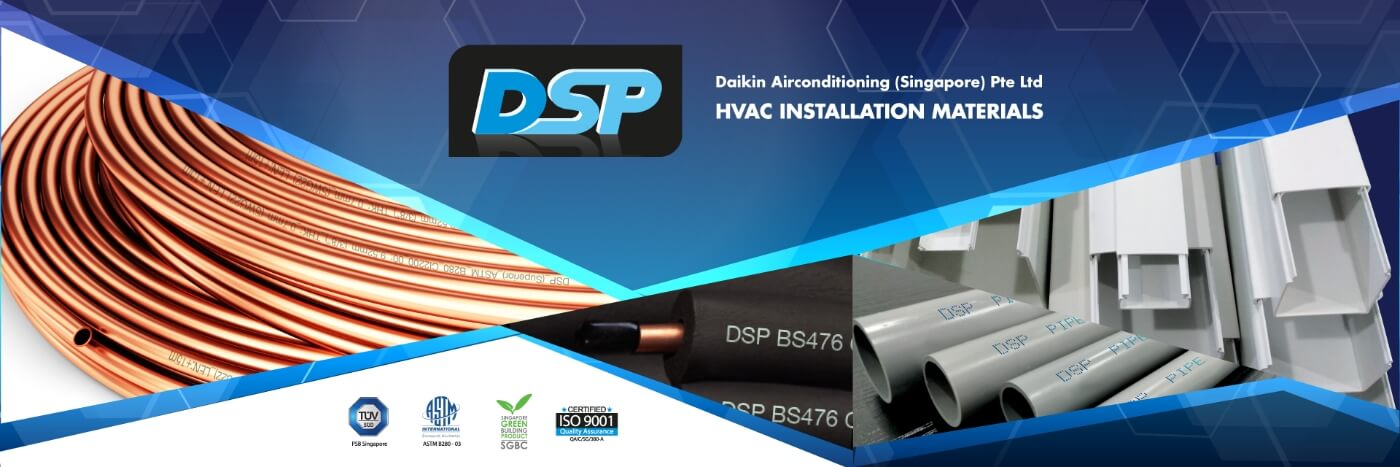Four materials you should know and look out for during aircon installation
Back to ListInvesting in an aircon is important, especially good installation materials together with regular servicing by professional service personnel.
The following four materials are things you should take note during new installation of your air-con system to maintain the aircon performance and its life span.

1. Copper Pipes
Copper pipes are one of the core materials used in air-conditioning systems. They are integral to an air-conditioning system because refrigerant needs to flow through the pipe to attribute cool air. Copper pipes which are installed poorly, or of poor quality may leak, resulting in a loss of cooling efficiency and are a common cause of air-conditioners not performing adequately. The air generated from your unit may then be warm and you could also find yourself spending more on your electricity bill as your aircon ends up working harder to generate cool air.
Poorly installed copper piping is extremely expensive to rectify. Gas leaks require pressure tests to isolate the problem area, and often the ending solution involves either redoing the piping in its entirety, or changing the whole system.
Hence, when it comes to copper pipes, pay attention to its thickness and its quality. It should provide maximum protection against the formation of harmful oxides that usually form during brazing operations.
Daikin supplies DSP seamless copper pipes that are TUV-tested for its quality and thickness to ensure excellent performance, strength, precision, cleanliness and longevity.
2. Insulation
In order to prevent the cold refrigerant flowing through the copper pipes from taking on heat from the environment, insulation is needed. A standard aircon insulator consists of a connected series of thick black foam that acts as the protective layer for the copper pipes. This foam acts like a big sponge which absorbs any condensate along the copper pipe.
Aside from protecting these copper pipes, the insulation also reduces the risk of water leakages and drippings from the aircon unit. It helps ensure proper performance of the aircon and reduces energy wastage at the same time. It also has an extra safety purpose - if a fire occurs, it can inhibit the speed at which the fire spreads, reducing the potential for serious damage.
Good insulation effectively reduces thermal and energy loss, contributing to energy efficiency, while an inferior one will result in condensation that will lead to degradation and tearing of the material. Additionally, check if the insulation offers antimicrobial protection to deter unwanted mould and bacterial growth, which will help your insulation last longer.
With all these considerations in mind, Daikin’s DSP Closed Cell Elastomeric Nitrile Rubber Tubing and sheet Insulation is specially designed to reduce energy consumption and prevent both condensation and corrosion. Its closed-cell structure minimizes moisture permeation to protect your aircon from corrosion, water vapor, and condensation which eliminates the extra water vapor barrier. It is also Singapore Green Building Product Certified for fewer emissions of volatile organic compounds for safer indoor air quality overall.
3. Condensate Pump
The condensate pump pumps water accumulated in the aircon’s pipe from a central point to a remote location, eliminating water, vapor, and condensation that might accumulate in the aircon’s pipe.
A good condensate pump will improve your indoor air quality and overall efficiency, as well as reduce electricity usage.
When looking into condensate pumps, look for one that also offers anti-microbial properties, as well as being non-flammable and water-based. It should also have hydrophobic coatings to inhibit the accumulation of dirt and grime within your aircon system. In addition, you would ideally want one that is quiet and doesn’t generate too much noise.
Daikin offers one of the quietest condensate pumps in the market and also boasts the above-mentioned properties, making it a suitable option for consideration.
4. Piping Connections
If you have a large property, you might need a longer piping connection for your aircon. For piping connections, opt for those that are non-brazen and fire free, and seal up tightly to prevent refrigerant leakage and the forming of condensation.
In addition, depending on where the pipes need to go, there may be areas where the contractors have to work in a tight and small space, so any connectors and joints should also be easy to install in confined areas. Daikin’s Tightfit is suitable for limited operating spaces due to its compact size and braze-free build.
Compared to other brands, Daikin’s Tightfit is much easier to install and doesn’t require any additional accessories for a safe and secure fit. You won’t need any extra expensive tools to install them, either. Thanks to Daikin’s double-sealing method, you can also get double protection that prevents condensation and leakage.
Should you wish to install new air-conditioners, make sure to do a checklist pertaining to the above-mentioned to ensure you are getting the best quality materials, which will save you money in the long run and result in a more efficient air conditioning system. If you need more in-depth advice on your installation materials, you can contact Daikin’s Service Center at 6311 8686 to get in touch with their trained and certified contractors.
-
Read more
Daikin’s R32 Refrigerant Can Lower Your Electricity Consumption
-
Read more
Poised For The Rise Of Green Consumerism – Meeting Consumer’s New Expectations
-
Read more
Things you never dreamed that your air-con can do
-
Read more
Importance of proper Air Con Servicing
-
Read more
What is Smart Home?

